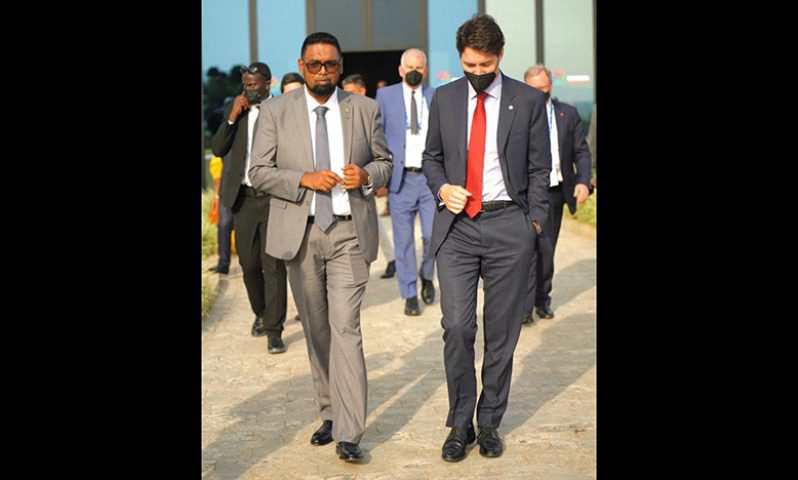–President Ali tells Commonwealth leaders, top executives during business forum
By Rabindra Rooplall in Kigali, Rwanda
PRESIDENT Dr. Irfaan Ali has said that there are four crises affecting Commonwealth countries, and there must be some balance in determining how to solve them.
President Ali was at the time speaking at the Commonwealth Business Forum (CBF) for Heads of Government and global Chief Executive Officers. The forum, held at the Intare Arena, was attended by Prince Charles and the President of Rwanda, Paul Kagame.
The four areas of focus that were highlighted by President Ali are the energy crisis, climate crisis, food crisis and a crisis of inequality.
“Only today [Thursday], we saw the President of Rwanda trying to address the crisis of inequality in vaccination by private investment in the production of vaccines,” President Ali told the gathering of leaders.
President Ali had joined the Rwandan President and other Heads of State and officials to witness the sod-turning ceremony for the construction of the mRNA vaccine factory in the special economic zone of Gasabo District, Rwanda. It is the first such facility in Africa, and is designed to end vaccine inequality on the continent.
Moving to other forms of inequalities, the Guyanese Head of State said 70 per cent of the energy for the Commonwealth still comes from burning coal, and oil and gas, yet on the African continent, only 53 per cent of the population has access to electricity.
He contrasted that with Canada, which has the most diversified energy portfolio, and one of the lowest energy costs in the world.
“…But, guess what, they have the highest per capita consumption in the Commonwealth, and perhaps one of the highest in the world,” President Ali said.
This, he related, raises the question in the energy scenario of what energy mix to sustain, and which to phase out.
Underscoring that Guyana faces its fair share of difficulties, President Ali said if there is no new development in the petroleum sector, then the monopoly that already exists is being protected for those countries that have been pumping oil for a long time.
Dr. Ali challenged the group of Commonwealth countries to address this issue in a realistic manner.
“We have to have a balance in this discussion; between what is needed in the interim period, in terms of fossil fuel against how the transition (to renewable energy) happens,” he said.
In terms of climate change, Dr. Ali said that developing economies collectively require US$200 billion annually to deal with only adaptation costs, without even considering what is needed for mitigation.
“Where’s this financing coming from? In my own country, we have standing forests at 87 per cent coverage in the country – stores 90.5 gigatons of carbon – (and) one of the lowest deforestation rates in the world, if not the lowest, (at) 0.05 per cent,” he said.
He continued: “But guess what? A forest that has a value of $500 billion earns nothing. The IMF says that the price for carbon to be traded now is at US$75 per tonne. But the actual price is less than US$10. So this is the reality of the environment you’re living in.”
Additionally, he said that when it comes to food security, by 2030, the global use of cereal and wheat is projected to increase.
“But guess what? Developing countries will account for 90 per cent of that increase. And what are we seeing? An increase of 20 per cent after the first quarter, and a projected 30 per cent at the end of the year for the consumer,” he said.
The Head of State added: “So, when we talk about energy, climate, food, we have to look at the inequality that exists in each category.”
The President noted, however, that there are opportunities for investment in each category.
“In CARICOM, I have the lead for agriculture and food security. So, I would like to see, out of this forum, not only concrete measures, but a commitment from all of us that we are going to identify, within the Commonwealth family, in the priority areas; in energy, climate change, food inequality. And I’m not even going to inequality technology, because that’s worse,” Dr. Ali said.
He added that there is a need for investments that will force the international financial institutions to put money into it these areas, particularly because of the “food catastrophe” that is on its way.



.jpg)











